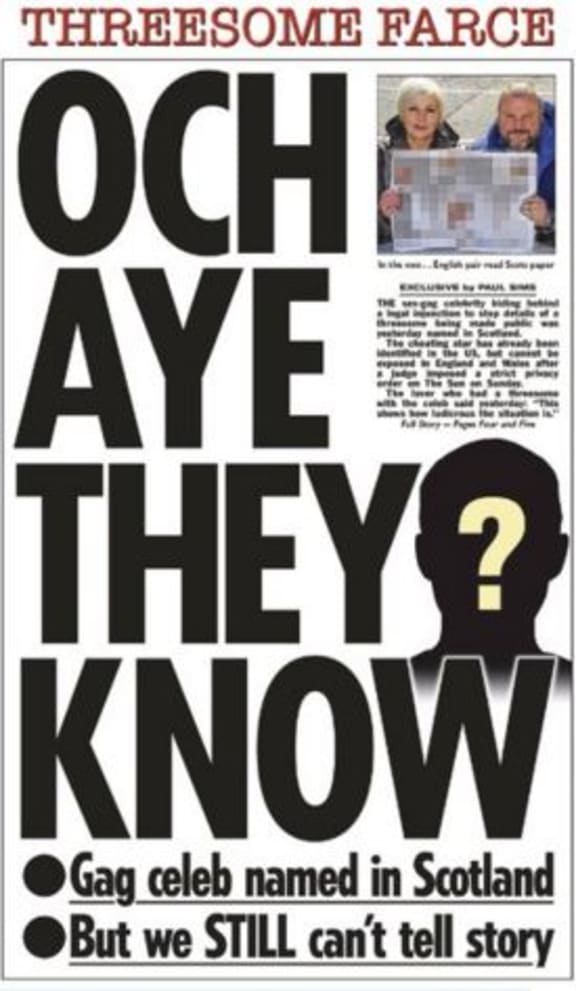When a court injunction prevented English and Welsh media from publishing a celebrity sex story, it didn't stop media in some other countries naming names. New Zealand outlets were left wondering whether they could - or should - follow suit.

A court has prevented English and Welsh media from publishing a celebrity sex story. Photo: 123RF
On his show's round up of European news on Tuesday, Paul Henry was keen to talk about the celebrity story English papers couldn't publish.
"We know who the famous couple are, but does everyone know their names?" he asked Newshub's European correspondent Tova O’Brien.
"Anyone with access to the internet and social media can know the names," Ms O'Brien said from London.
But she wasn't about to lift the lid.
"On one hand, I'm for freedom of the press and freedom to publish," she said. "But on the other hand, it's a private matter between consenting adults and there's nothing illegal here. These people are public figures but they're not politicians or being funded by the public."
A good summary.
"The upshot is the law is ridiculous . . . when the internet is so global," said Ms O'Brien.
That was the argument raised by many in the UK media.
Papers in the US and Canada published the names and they were quickly circulated on social media.
A Scottish paper also named names, prompting The Sun to complain on its front page: "Gag celeb named in Scotland. But we STILL can't tell story."

The Sun bristled on its front page. Photo: screenshot
On RNZ National last Tuesday Morning Report did name one of the celebrities. Afterwards, presenter Susie Ferguson said:
This interview, because of the injunction, is not going to be available on the internet
But would New Zealand media have broken the law by naming names online?
Professor Ursula Cheer is dean of the University of Canterbury's law school and editor of the standard reference work Media Law in New Zealand. She said this was yet to be tested.
"In defamation law, if something's uploaded in New York but somebody downloads it in New Zealand, then it has been published in New Zealand. If that was followed for privacy, the possibility of it getting to the UK is there and someone could be pursued," Prof Cheer told Mediawatch.
Whether anyone would actually follow up on that was another question, but in theory it was a contempt of court in the UK, she said.
Fuelling the farce
Another paper convinced the "threesome story gag" was "farcical" was the UK's Daily Telegraph.
The paper's home affairs correspondent, David Barrett, called it as much in an article (incidentally, the New Zealand Herald republished the piece without crediting it to either David Barrett or The Telegraph).
But why did the court order the injunction?
After an extra-marital sexual encounter five years ago, one party went to tabloid The Sun on Sunday with the story.
An injunction was sought but was not initially granted, until one of the celebrities appealed.
The appeal judges said the case involved a "committed couple" and "occasional sexual encounters with others did not detract from that commitment”. The proposed story about the celebrity's sex life would be "devastating" and the judges ruled his rights outweighed the newspaper's rights to publish.
In other words, it looked like a clear breach of privacy for profit in which there could be little genuine public interest.

Professor Ursula Cheer Photo: supplied
With that in mind, should New Zealand media be airing the story?
Prof Cheer said our privacy law was similar to that of the UK, so our media outlets were in the same position as those in the UK. But the real question was not a legal one, she said, but an ethical one, even if no names were named.
"An order has been made recognising a human right. We might not agree with it but isn't it ethical that we should follow that rather than jumping on the bandwagon to publish stories about it?"
Media reports have also reflected their own concerns about privacy, she said.
"What's focused on in the reports is that this person is suppressing information, taking advantage of their children so they don't have to disclose what they've been up to - and that a judge is yet again telling newspapers what not to report and (they say) the law is a farce because all this information is already out there."
"That's only half the story and it's poor reporting," Prof Cheer told Mediawatch.

